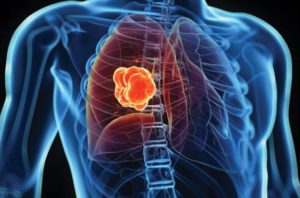 The second leading cancer in both men and women is LUNG CANCER. According to the American Cancer Society’s Statistics, there will be 228,150 new cases of lung cancer diagnosed and 142,670 deaths from lung cancer this year alone. Despite these grim statistics, nearly 430,000 people have at some point in their lives been diagnosed with lung cancer, and yet they are alive and well with zero remission. This is predominantly because their cancers were caught early through lung cancer screenings.
The second leading cancer in both men and women is LUNG CANCER. According to the American Cancer Society’s Statistics, there will be 228,150 new cases of lung cancer diagnosed and 142,670 deaths from lung cancer this year alone. Despite these grim statistics, nearly 430,000 people have at some point in their lives been diagnosed with lung cancer, and yet they are alive and well with zero remission. This is predominantly because their cancers were caught early through lung cancer screenings.
Three main types of lung cancer are non-small cell lung cancer, small cell lung cancer, and lung carcinoid lung cancer.
• Non-Small Cell Lung Cancer (NSCLC) is the most common type, affecting nearly 85% of those with lung cancer. Fortunately, this form of carcinoma usually grows at a slower rate. There are three subsets that makeup NSCLC, Squamous, adenocarcinoma, and large cell.
• Small Cell or Oat Cell Cancer affects nearly 10% of the lung cancer population and spreads very rapidly.
• Lung Carcinoid affects about 5% of those with lung cancer. It grows very slowly and rarely spreads.
Smokers are of course at higher risk of developing lung cancer. However, the stereotype that often coincides with a lung cancer diagnosis is that patients are assumed to have smoked. But the stark reality is that in many cases, lung cancer diagnosis happens to patients that have never smoked a day in their life.
Non-smokers that have lung cancer are usually identified as those that have been exposed to environmental carcinogens like, cleaning products, diesel exhaust, radon gas, asbestos or those with genetic mutations. Research suggests that screening a high-risk population for lung cancer can drastically reduce the number of mortalities from this disease.
Screening via a CT scan of the chest
Low dose CT scans are advantageous in identifying and screening for lung cancers. If lung cancers are found in the early stages, the treatment options and outcomes are much more successful. Because low dose CT scans can detect very small masses in the lungs, by detecting cancerous tumors at an early stage, an individual’s survival rate may be significantly improved.
Lung cancer screenings are very important for smokers and former smokers, especially those 55-75 years of age. This is due to the prevalence of lung cancer seen in this population. The screenings are also vital for individuals exposed to carcinogens, or those that show signs and symptoms of lung disorders.
Radiology Regional Center Offers Advanced CT Lung Screening for the Detection of Cancer Called Ultrafast
The Ultrafast Screening of the Lungs is a non-invasive CT scan that can detect abnormalities and lung cancer in its earlier, more curable stages using a new technique called helical low-dose CT scanning. The screening is far more accurate in finding lung tumors than a chest x-ray, which is the traditional diagnostic tool. It can find lung cancers when they are as small as the diameter of a soda straw, as compared with a chest x-ray that find them when they are about the size of a quarter.
Early detection is critical for lung cancer diagnosis and recovery. It can significantly increase your survival rate and save your life!
Is this exam covered by insurance?
Medicare and most insurance companies are now covering this exam for eligible, “high-risk” patients once per year as part of their preventative services offerings. Check with your insurance provider for specific coverage information.
I don’t have insurance. Can I still get this exam?
Of course! We offer the exam to self-pay patients for only $179 at the time of service.
Radiology Regional Center has 11 locations to serve you, and they are all accredited by ACR and ICANL. At these convenient locations, they can accommodate same-day, walk-in x-rays, and scheduled appointments. When you arrive, the welcoming environment is different than larger, hospital-owned facilities and the knowledgeable staff works with you one-on-one to make you comfortable, and to plan you for your test. But it doesn’t start there. Radiology Regional begins its personalized attention when they schedule your appointment to make certain that you are well-prepared ensuring the best results and outcomes. The intricate imaging isn’t rushed or taken lightly. Each patient receives care as if they were family.
To schedule a lung cancer screening appointment, please contact RadiologyRegional today at:
(239)-936-4068 (Lee) | (239)-430-1513 (Collier)
(239)-425-4678 (Español)
It could save your life.










